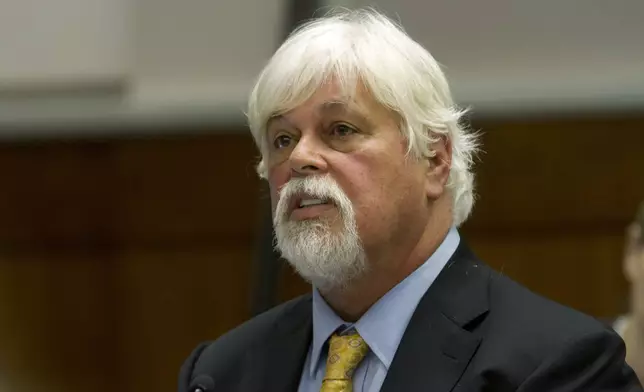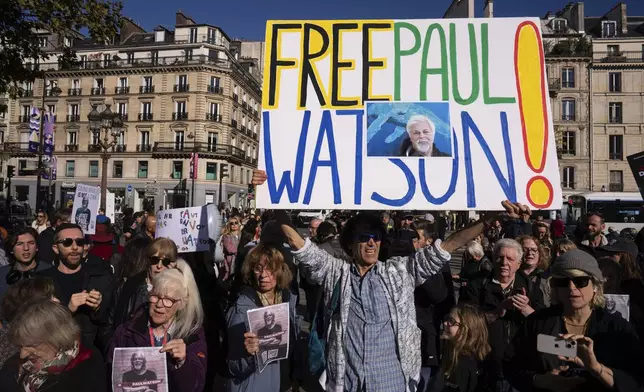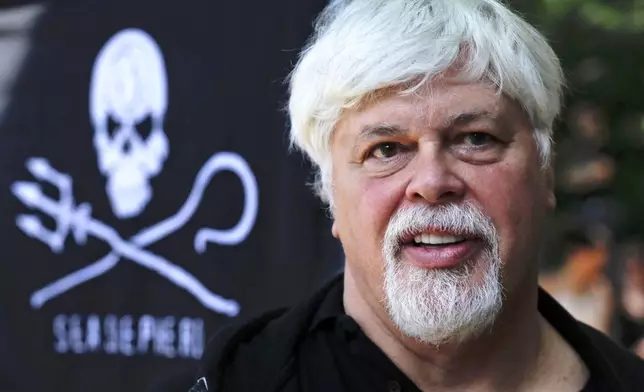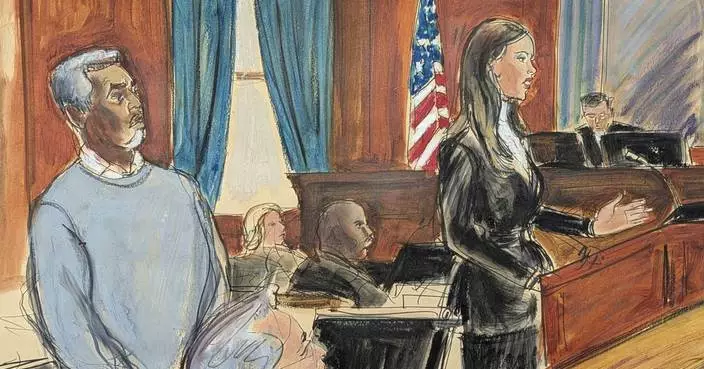LONDON (AP) — Anti-whaling activist Paul Watson was freed from prison in Greenland on Tuesday after five months in custody, and will not be extradited to Japan where he is wanted on charges of obstructing a whaling ship.
Watson is planning to return home to be reunited with his family during the festive season, he told The Associated Press upon his release.
Click to Gallery
Environmental activist Paul Watson waves as he is released from prison in Nuuk, Greenland, Tuesday Dec. 17, 2024. (Alataq Moeller/Ritzau Scanpix via AP)
Environmental activist Paul Watson is released from prison in Nuuk, Greenland, Tuesday Dec. 17, 2024. (Alataq Moeller/Ritzau Scanpix via AP)
FILE - Anti-whaling activist Paul Watson, founder of the Oregon-based Sea Shepherd Conservation Society, testifies during a contempt of court hearing in federal court, Wednesday, Nov. 6, 2013, in Seattle. (AP Photo/Karen Ducey, Pool, FILE)
FILE - People demonstrate to support Sea Shepherd founder Paul Watson, known for his decades-long fight against Japanese whaling and arrested in Greenland, and who has asked France's president for political asylum, Wednesday, Oct. 23, 2024 in Paris. (AP Photo/Louise Delmotte, File)
FILE - In this May 23, 2012 file picture Paul Watson, founder and President of the animal rights and environmental group Sea Shepherd Conservation takes part in a demonstration against the Costa Rican government near Germany's Presidential residence during a visit of Costa Rica's president Laura Chinchilla in Berlin, Germany. (AP Photo/Markus Schreiber, File)
“I’m certainly quite relieved," Watson, 74, said during a video interview from Nuuk, Greenland's capital. "This gives me an opportunity to return home to my two children before Christmas.”
Japan had asked Denmark to extradite Watson, who had been in custody in Greenland since his arrest under a Japanese warrant.
Japan's Chief Cabinet Secretary Yoshimasa Hayashi told reporters Wednesday in Tokyo that “it was regrettable that Denmark rejected Japan's extradition request." He said Watson is still wanted in Japan and internationally and that “Japan will continue to respond appropriately based on law and evidence.”
Watson's foundation said he faced a maximum sentence of 15 years in prison in Japan, which does not have an extradition treaty with Denmark.
On his way back to France, where he has settled, Watson said he will be careful not to be caught again.
“I have to make sure that I don’t land in Iceland or another country where Interpol might try to have me arrested again,” he said. “Apparently, the red notice is still there," he added, in a reference to the system which flags people deemed fugitives to law enforcement worldwide and is one of the crime-fighting organization's most important tools.
Interpol confirmed to AP that its red notice issued at the request of Japan is still valid, meaning that Watson could be arrested again. “It is each member country’s decision whether to arrest an individual who is the subject of a red notice, which is not an international arrest warrant,” the agency said.
Watson should be safe in France. The country and its president, Emmanuel Macron, have been supportive of Watson, who said he was given an honorary citizenship by the city of Paris last week.
“I think that the support from France has been very instrumental in this case,” Watson said.
The Canadian-American citizen is a former head of the Sea Shepherd Conservation Society, whose high seas confrontations with whaling vessels have drawn support from celebrities and featured in the reality television series “Whale Wars.”
Japan’s coast guard had sought his arrest over an encounter with a Japanese whaling research ship in 2010 when he was accused of obstructing the crew’s official duties by ordering the captain of his ship to throw explosives at the whaling ship.
Watson denied the accusation.
“Well, it’s a total fabrication. We never used explosives. Ever. We did use stink bombs, which are quite harmless,” he said.
Watson was subject to an Interpol red notice, and the captain — a New Zealand citizen — was convicted of assault and given a suspended prison term, which allowed him to leave Japan.
Watson was arrested on July 21 when his ship docked in Nuuk, Greenland’s capital. Japan had asked Denmark to hand over Watson so he could be tried in Japan. Greenland is an autonomous territory of Denmark.
“I think it all backfired on Japan, because this has put enormous focus on Japan’s continued illegal whaling operations," Watson said. "So my time here for five months has actually served a purpose. It’s been an opportunity to continue to expose Japan’s illegal whaling activities.”
The Danish Justice Ministry said in a statement that the conditions for extradition were met, but it had not received adequate guarantees from Japanese authorities that the time Watson had already served in custody would be counted against any sentence he would receive in Japan.
Watson left Sea Shepherd in 2022 to set up his foundation, which alleged at the time of his arrest that the action was politically motivated — and called for his release.
Japanese officials say their extradition request was not based on Watson’s anti-whaling views but purely based on criminal allegations.
He was detained in Germany in 2012 on a Costa Rican extradition warrant but skipped bail after learning that he was also sought for extradition by Japan, which has accused him of endangering whalers’ lives during his operations in the Antarctic Ocean. He has since lived in countries including France and the United States.
He pledged to continue fighting.
“I’ve had five months of not really doing much, so I’m not really tired,” he said. “But we have a ship, being prepared, to oppose Icelandic whaling operations in June next year. And we have a ship in Australia that is ready to intervene against Japan if they return to the Southern Ocean whale sanctuary. So we’re prepared to take action when we need to.”
Japan's says whale meat is part of its food culture and that it supports sustainable use of whales. Japan withdrew from the International Whaling Commission in 2019 and has since resumed commercial whaling within its exclusive economic zone.
“Whaling only continues to exist in Japan through massive subsidies,” Watson claimed. “In fact, $30 million from the tsunami relief fund was channeled into the whaling industry after 2011. So, you know, this does not benefit the Japanese people at all in any way, shape or form. In fact, what it is is an embarrassment to the Japanese people.”
Associated Press Writers Jamey Keaten, David Keyton and Mari Yamaguchi contributed to this report.
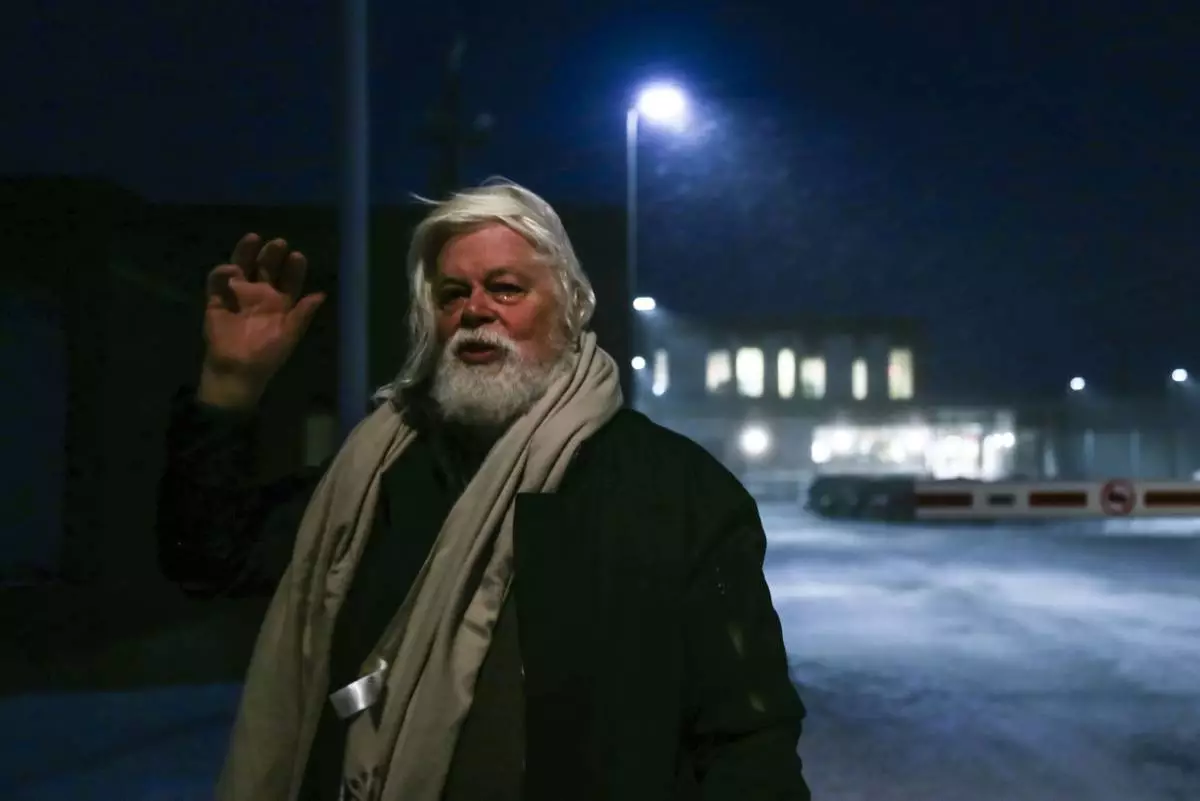
Environmental activist Paul Watson waves as he is released from prison in Nuuk, Greenland, Tuesday Dec. 17, 2024. (Alataq Moeller/Ritzau Scanpix via AP)
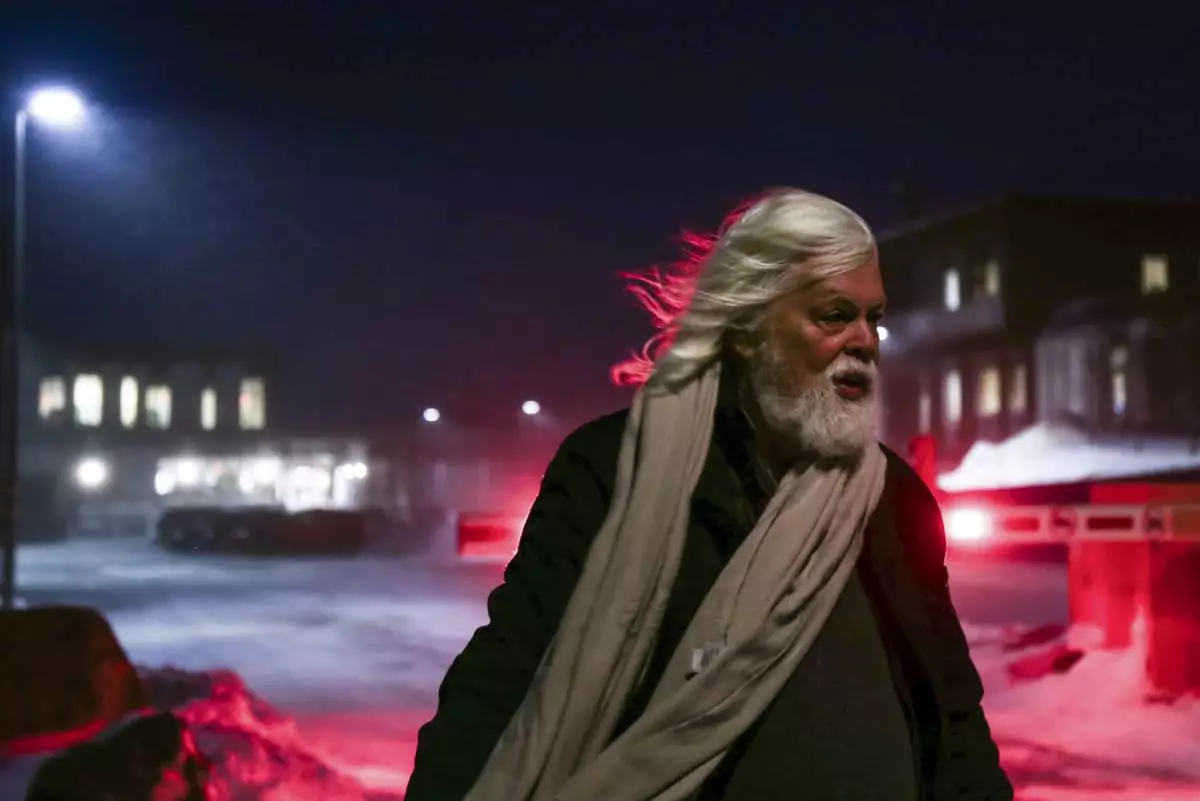
Environmental activist Paul Watson is released from prison in Nuuk, Greenland, Tuesday Dec. 17, 2024. (Alataq Moeller/Ritzau Scanpix via AP)

FILE - Anti-whaling activist Paul Watson, founder of the Oregon-based Sea Shepherd Conservation Society, testifies during a contempt of court hearing in federal court, Wednesday, Nov. 6, 2013, in Seattle. (AP Photo/Karen Ducey, Pool, FILE)

FILE - People demonstrate to support Sea Shepherd founder Paul Watson, known for his decades-long fight against Japanese whaling and arrested in Greenland, and who has asked France's president for political asylum, Wednesday, Oct. 23, 2024 in Paris. (AP Photo/Louise Delmotte, File)

FILE - In this May 23, 2012 file picture Paul Watson, founder and President of the animal rights and environmental group Sea Shepherd Conservation takes part in a demonstration against the Costa Rican government near Germany's Presidential residence during a visit of Costa Rica's president Laura Chinchilla in Berlin, Germany. (AP Photo/Markus Schreiber, File)
PARIS (AP) — For powerful men in France’s film industry, this was a week of reckoning. Gérard Depardieu — the country’s most famous male actor — was convicted of sexual assault. Two days later, the Cannes Film Festival barred another actor accused of rape from walking the red carpet.
Together, the decisions sent a message that France had long resisted: that artistic brilliance may no longer shield those who abuse their power.
For decades, Depardieu was revered as French cinema’s “sacred monster” — a towering talent whose gluttony, volatility and magnetism became part of his myth. With more than 250 films to his name, many believed he would remain untouchable even after more than 20 women accused him of sexual misconduct.
Now, that myth has cracked.
The verdict has revived a broader question France has ducked since the dawn of #MeToo: Can a country that celebrates seduction and irreverence finally hold its male icons to account?
France has long lived its own #MeToo contradiction. That talent, charm, or intellect forgives misconduct. That the art excuses the artist. This is the land that gave the world Brigitte Bardot’s pout and Catherine Deneuve’s poise — and then watched both recoil when the movement came knocking. Deneuve has defended “the right" to seduce, while Bardot has dismissed feminism outright: “I like men.”
But the ground is shifting — fast.
Depardieu was handed an 18-month suspended sentence Tuesday for groping two women on a 2021 film set. He denies the charges and is appealing.
“It’s the end of impunity of artists with a capital A,” Carine Durrieu Diebolt, a lawyer for one of the two women who won their case against Depardieu, told The Associated Press. The verdict represented “a bookend for putting actors on a pedestal because they were talented,” she added.
Two days later, the prestigious Cannes Film Festival barred actor Théo Navarro-Mussy — accused of rape by three former partners — from attending the premiere of a film he stars in, even though the file was dropped for lack of evidence. The women are launching a civil complaint.
Navarro-Mussy denies wrongdoing. His lawyer said that she’s unaware of any ongoing proceedings against him.
What stunned wasn’t just the decision, but who made it. Cannes director Thierry Frémaux had long been seen as emblematic of the old guard. He defended Roman Polanski for years and continued to screen his films despite the director’s 1977 guilty plea in the U.S. for sex with a 13-year-old. In 2018, when asked why Cannes still included Polanski, Frémaux said: “These are complicated matters.”
Frémaux opened 2023's festival with a film starring Johnny Depp, despite the actor’s highly public legal battle with ex-wife Amber Heard over allegations of domestic abuse, in which he was never criminally charged. When asked about the backlash, Frémaux replied: “I only have one rule: it’s the freedom of thinking, and the freedom of speech and acting within a legal framework.”
This week, the rules changed.
“The Cannes decision is of course linked to the Depardieu verdict,” said Céline Piques of Osez le féminisme (“Dare Feminism!”), a group that campaigns against sexual violence. “(They’ve) realized which way the wind is blowing. Frémaux is trying to right the wrongs.”
Not everyone welcomed the verdict — or what followed — as a cultural turning point.
Fanny Ardant, one of French cinema’s grandes dames and a longtime friend of Depardieu, sat on his side in court. She is now directing him in a film in Portugal, despite the conviction.
“Fanny Ardant? She completely missed the point,” said Piques. “She downplayed the violence, normalized it. That’s rape culture, plain and simple.”
Juliette Binoche, Cannes jury president and one of France’s most respected actors, struck a note of restraint: “He’s not a monster. He’s a man — one who has, apparently, been desacralized.”
Her caution captured something deeper: a country caught between the urge to change and the instinct to protect its giants.
In 2024, more than 22,000 rapes were reported in France. Fewer than 3% led to convictions. “The Depardieu verdict shows there’s progress,” said lawyer Anne-Sophie Laguens, who works with victims of sexual assault. “But for most women, the barriers to justice remain enormous.”
When Bertrand Cantat — front man of Noir Désir and once one of France’s bestselling rock singers — launched a 2018 comeback tour, he had served just four years in prison for killing his partner, actor Marie Trintignant, during a violent assault.
Despite public outrage, he returned to the stage and performed.
“That would be unthinkable today,” said Piques. “The public mood has changed. What we tolerate has changed.”
One breakthrough came not from a film set, but an Avignon courtroom. The conviction of 51 men for drugging and raping Gisele Pelicot — a case long ignored despite her pleas — marked a turning point. For years, shame was hers. Now, it belongs to the perpetrators.
“It proved rapists aren’t just strangers in alleys,” said Piques. “They’re husbands. Colleagues. Respected men.”
That shift in shame is now rippling through the cultural world — once seen as a bastion of male privilege. Recently. director Christophe Ruggia was convicted of abusing actor Adèle Haenel when she was a minor, though he is appealing; and actor-director Nicolas Bedos, was sentenced for sexual assault.
Slowly but surely, yes. The system that long protected men like Depardieu is not yet dismantled, but it is shifting.
As one of the actor’s accusers said through tears after the ruling: “I’m very, very much satisfied with the decision. That’s a victory for me, really. And a big progress, a step forward. I feel justice was made.”
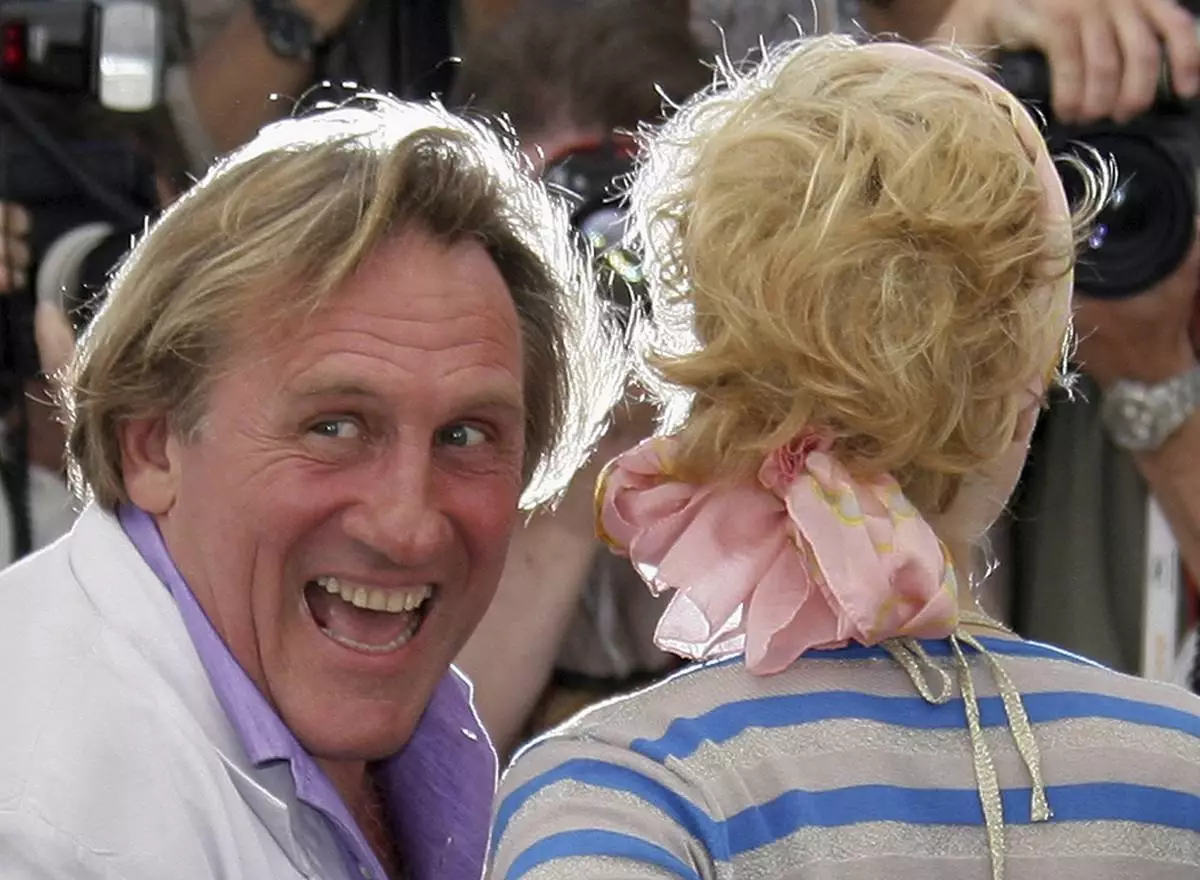
FILE - French actor Gerard Depardieu, left, and Belgian actress Cecile de France pose during a photo call for the film "Quand J'etais Chanteur," at the 59th International film festival in Cannes, southern France, on May 26, 2006. (AP Photo/Francois Mori, File)










